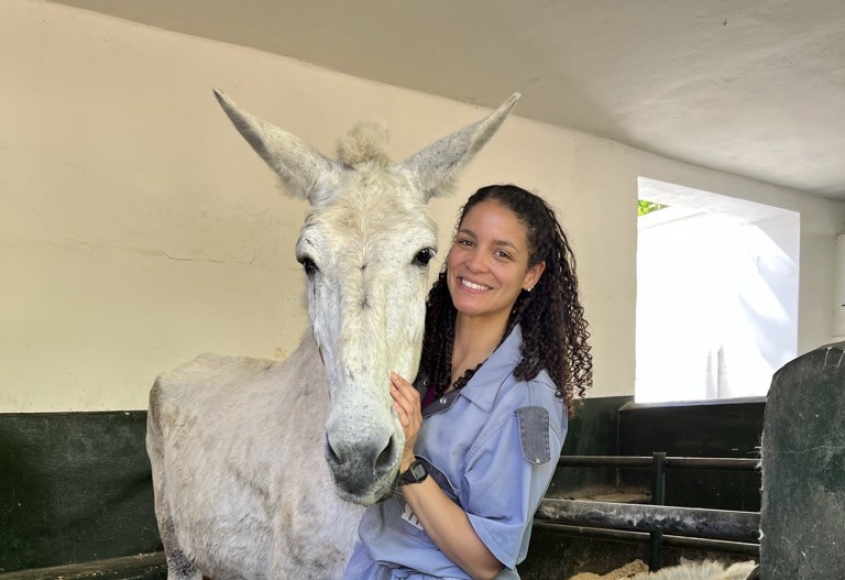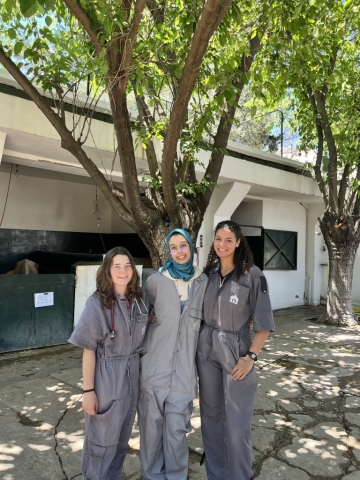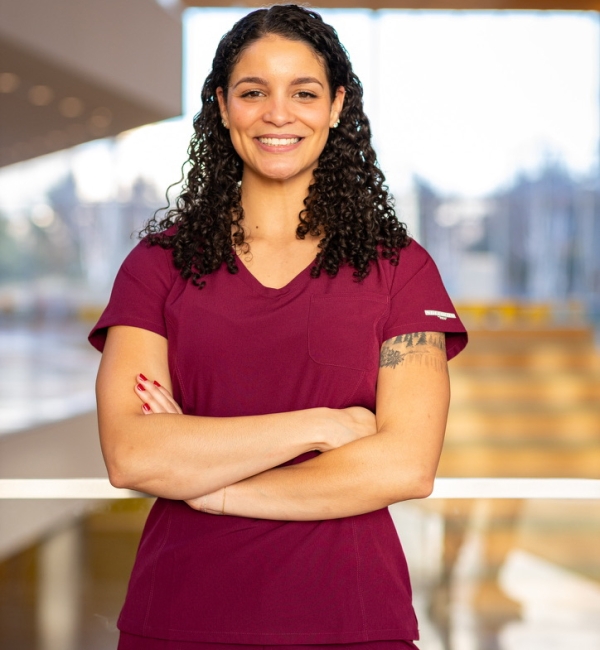Student blog: The working equids of Fez, Morocco
In my second year of veterinary school, I assisted on a research project with Jordyn Boesch, D.V.M. ’06, associate clinical professor and section chief of the Anesthesiology and Pain Medicine Service. The project focused on pain evaluation in cats after being spayed, introducing me to the world of pain scoring — how the assessment of behavior, facial expression, and positioning can be used to assess pain. It made me realize the importance of pain management and adequate pain assessment for our veterinary patients. This inspired me to participate in a project that combined two things I was passionate about, equine medicine and pain assessment. After months of planning and preparation, I was set to put my ideas into action. Made possible through grant funding by the Expanding Horizons program at the Cornell University College of Veterinary Medicine, I was able to participate in a six-week externship at The American Fondouk, an equid charitable hospital that provides free veterinary care to the working equids of Fez.
In Morocco, donkeys, mules, and horses play a crucial role in supporting the livelihood of the people living in low-income communities where financing vehicles and farming equipment is not feasible. Many of the injuries these animals have are a direct reflection of their work and husbandry conditions. Such injuries include lacerations, lameness, dental disease, colic, weakness and harness/pack wounds. In my project, I assessed the severity and associated pain of harness or load-bearing pack wounds. I used two pain scoring systems, one that was developed for horses, and the other for donkeys. Mules have no developed scoring system, so I used the combination of the donkey and horse system. Even though the animals are closely related, they exhibit different signs when experiencing symptoms of pain.
A typical workday begins with morning rounds on all the hospitalized patients, checking their overall health status, administering medication, and deciding on their plan for the day. I rotated between working on the hospitalized patients and taking outpatients. With outpatients, you had to be prepared for whatever situation came through the door. This could be anything from simple appointments such as routine vaccinations and castration, or complex cases such as colic, lacerations, and fractures.
I personally loved working on the hospitalized inpatients. This gave me time to really connect with the animals and improve my bandaging skills. As a true animal lover, it is a tough task not to get too attached to the patients. The first patient I was assigned was a large male mule who came in for severe swelling on his right eyelid. Initially, his swelling was so extensive we were unable to open his eyelids enough to see his eyeball. Although large, he was gentle and stoic for the duration of his time at the hospital.
During my time at the hospital, we saw the greatest number of mules, followed next by donkeys, with horses as the smallest percentage. This gave me valuable training opportunities as most of my experience in the United States has been primarily horse-focused. While all these animals are equids, they do have significant differences in treatment approaches, hydration requirements, and anatomical differences. This opportunity gave me the chance to develop different treatment approaches catered to each species. For example, donkeys are extremely stoic and will hide their clinical signs. A horse, on the other hand, is much more obvious in its behavior, and it will surely let you know if it is in pain or distress. This pushed me as a student to perform very thorough physical exams. We also assessed and treated cases that we do not commonly see here in the United States, such as colic from ingestion of trash/ropes, rectal prolapse, and tetanus.
As I enter my clinical year, I feel much more confident, competent and well-rounded from this opportunity. The clinicians and interns at The American Fondouk were amazing teachers and were always there to offer advice and guidance. I am grateful for the support and opportunities for growth they provided me. They taught me how to medically manage colic cases from start to finish, proper bandaging techniques, and a great protocol for bite wound repair. I will be forever grateful for the lessons learned from those who mentored me at The American Fondouk. I am incredibly thankful and appreciative for the opportunity given to me by the Expanding Horizons International Experiences Committee Members. I also could not have survived without the guidance offered by mentors at Cornell, the staff at The American Fondouk, and my extern-mate Meg, a veterinary student from London.
Through this journey, I was made aware of the importance of preventative medicine such as routine vaccinations, dental examinations, and parasite control. During my six-week externship, we saw multiple equids with tetanus, a diagnosis I had not seen before. The first donkey patient we had presented with a five-day history of not eating, not defecating, and “not moving much,” as described by the owner. By the time she arrived, she had severe lockjaw and was unable to move at all. As she was unnamed, we nicknamed her “Tetanus Donkey.” Even though she had a poor prognosis, we still provided her with the best care possible. She was on a medication regimen that included dosing every two hours and syringe-feeding blended carrot and apple puree. Unfortunately, she did not respond well over time and began having collapsing episodes. While she didn’t make it in the end, it was truly heartwarming to watch her make some progress during treatment. After this long and dedicated treatment plan for Tetanus Donkey, I grew an appreciation for preventive medicine. This inspired me to investigate what it would take to provide vaccine clinics in areas that are inaccessible to veterinary care. Hopefully something I can work towards in my future veterinary career. And by those efforts, my goal is to have one less Tetanus Donkey.
Margaret Whittington, class of 2025, is a D.V.M. student at the Cornell University College of Veterinary Medicine. She is interested in equine medicine and hopes to continue to make a difference in the lives of working animals internationally. After graduation, Margaret will serve as a veterinarian in the U.S. Army. She hopes to eventually deploy internationally and work with locals to improve animal husbandry and working conditions.








